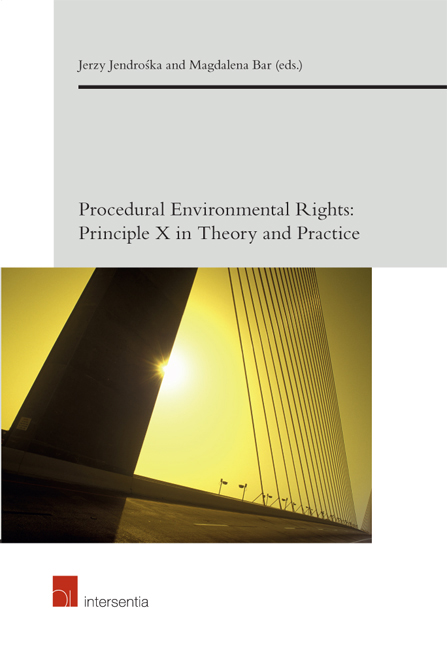Book contents
- Frontmatter
- Contents
- Introduction Procedural Environmental Rights in Theory and Practice
- Procedural Environmental Rights: Status and Developments
- Procedural Environmental Rights in Practice
- Procedural Environmental Rights in the Jurisprudence of the European Court of Human Rights and Their Impact on Criminal Procedure Law
- Ilva: An Environmental Case
- The Improvement of Article 37 of the EU Charter of Fundamental Rights – A Choice Between an Empty Shell and a Test Tube?
- Public Participation
- Access to Justice
- Procedural Environmental Rights and Nature Protection
- Procedural Environmental Rights and EIA
- Procedural Environmental Rights and Climate Change
Ilva: An Environmental Case
from Procedural Environmental Rights in Practice
Published online by Cambridge University Press: 12 October 2018
- Frontmatter
- Contents
- Introduction Procedural Environmental Rights in Theory and Practice
- Procedural Environmental Rights: Status and Developments
- Procedural Environmental Rights in Practice
- Procedural Environmental Rights in the Jurisprudence of the European Court of Human Rights and Their Impact on Criminal Procedure Law
- Ilva: An Environmental Case
- The Improvement of Article 37 of the EU Charter of Fundamental Rights – A Choice Between an Empty Shell and a Test Tube?
- Public Participation
- Access to Justice
- Procedural Environmental Rights and Nature Protection
- Procedural Environmental Rights and EIA
- Procedural Environmental Rights and Climate Change
Summary
ABSTRACT
A history of conflicts and failures: the Ilva case might be summarized like that. The Ilva steel plant, located just outside the city of Taranto, is a big polluter, but also a provider for thousands of jobs. In 2012 criminal judges seized core parts of the factory, in order to shut it down; the Italian Government intervened in order to overcome the seizure and its effects. The citizens of Taranto are torn between the anxiety for their health, jeopardized by the industrial activities, and the concern for their economic future, should the plant be closed. Failures are evident in the persisting unsustainability of the environmental, social and economic crises. In this context, lack of reliable and coherent information and problematic public participation has made things worse, delaying and altering the awareness of the local community and, in the end, procrastinating the adoption of incisive measures.
KEYWORDS
Environmental permit; Ilva; Information; Integrated pollution prevention and control; Participation; Pollution; Steel plant; Sustainable development.
INTRODUCTION: THE ISSUES
Ilva is the Latin name for Isola d'Elba, a beautiful island rich in iron offthe coast of Tuscany. Ilva is also the name of the company (Ilva s.p.a.) that owns, among others, the steel plant located just outside the city of Taranto, in the Southern Italy Region of Apulia. Its business is the production, processing and marketing of steel products. The Ilva steel plant in Taranto has been operating, and polluting, for more than fifty years, but it is just in the last few years that it attracted a high level of legislative, administrative, judicial and mass media attention.
The basic and dramatic dilemma concerning the Ilva factory in Taranto is between shutting it down and letting it open. In the first case, social and economic measures would be needed in order to avoid a “welfare disaster”, as thousands of people would lose their jobs or substantially reduce their income and their business chances. In the second case, environmental measures would be needed in order to avoid further deterioration of the quality of air, water and soil, which would put the health of the population under additional, intense, stress. Both solutions aim to protect some basic rights and interests: life and health, in the first case; work and private enterprise, in the second case.
- Type
- Chapter
- Information
- Procedural Environmental RightsPrinciple X in Theory and Practice, pp. 79 - 96Publisher: IntersentiaPrint publication year: 2018



